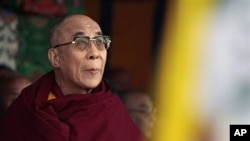In a move that is not unexpected, the Dalai Lama has announced his decision to step down as political leader of the exiled Tibetan movement.
The Dalai Lama says the time has come to pass on his political role to a new leader who is freely elected by the Tibetan people.
He was speaking on the anniversary of the 1959 failed uprising against Chinese rule in the northern Indian town, Dharamsala, where the exiled Tibetan leader has lived since fleeing his homeland more than half a century ago.
The 76-year-old Dalai Lama says his desire to devolve political authority has nothing to do with shirking responsibility, but is intended to benefit Tibetans in the long run.
The Dalai Lama, who has been seeking autonomy for Tibet within China, says he remains committed to playing his part in the cause of Tibet.
His announcement was widely anticipated and is seen as a way to create a stable political system that will hold the Tibetan community together.
The Dalai Lama says that, since the early 1960s, he has instituted reforms to take the Tibetan people along the path to democracy.
The Dalai Lama has gradually been delegating political power to a democratic administration while retaining his more significant role as spiritual leader of the Tibetan movement.
A political analyst and China analyst in New Delhi, Bhaskar Roy, says the Dalai Lama’s move will make the Tibetan government-in-exile based in Dharamsala more self-reliant.
"It would be from my point of view more effective. It would be modernizing the institution of the Tibetan government. And, that is why it would be much more empowered," Roy said.
In Beijing, Chinese Foreign Ministry spokeswoman Jiang Yu describes the Dalai Lama’s move as a "trick."
She says he has been talking of retirement for the past few years and that the announcement is meant to deceive the international community.
Jiang called him a political exile, under a religious cloak, now engaged in activities aimed at splitting China.
China blames the Dalai Lama for stirring up unrest in Tibet and accuses his followers of fanning the violent anti-China protests which Tibet witnessed three years ago.
In his speech, the Dalai Lama called on China to do more to earn the international community’s respect and trust by developing greater transparency. Calling the country an emerging world power, he said Beijing has huge potential to contribute to human progress and world peace.
The Dalai Lama says he will begin the formal process of stepping down when the Tibetan-government-in-exile meets on Monday.
The move could cause some concern among Tibetans, because no one else has the stature and influence of the Dalai Lama.




